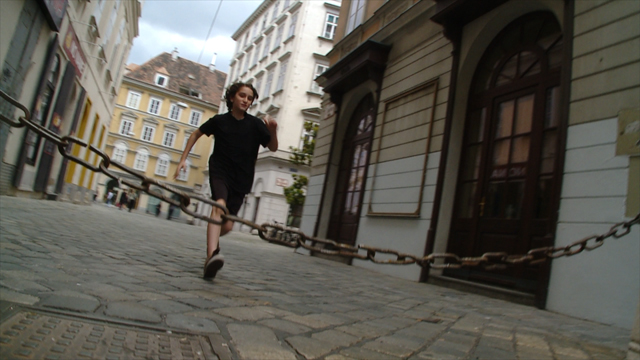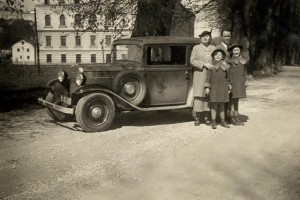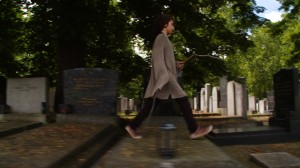
When I first began researching my mother’s family, even before Freud’s Butcher the blog was born, I heard about a film called “Auf Wiedersehen: ‘Til We Meet Again.” I knew little about it, but was intrigued by the synopsis on the site that I found for ordering it:
In this compelling and often funny tale of recovery and renewal, author and activist Linda G. Mills is propelled by her family’s life-threatening experience of September 11, 2001 to return to the site of her mother’s flight from Vienna in 1939. Accompanied by her comically restless ten-year old son and highly opinionated mother, Linda discovers unsettling truths that upend familial and historical myths.
My mother fled from Vienna in 1939 too. This film sounded like something I could connect with.
I’ve since met filmmaker Linda Mills — there are about two degrees of separation between us — and watched the film three times, each time gaining additional insights. It’s impossible for me to write a conventional review because the film speaks to me so personally, so I thought I’d just muse on topics I found particularly meaningful.

The Sounds of Silence — And Of German
Early in the film, Linda says of her parents, “I expressed some interest in learning German, but they refused to allow it. It was a way they could keep their history and their stories by keeping the language to themselves. I knew nothing about that part of my past except that there was a lot of pain and suffering.”
This was precisely my experience. By withholding access to their language, my parents withheld access to their experience. I had this vague idea of bad occurrences that dared not be brought into the light of day.
Linda wanted things to be different for her son, Ronnie. “I had an uncomfortable feeling that this [9/11] had happened before. I wanted to be able to talk to my son about this topic in a way my mother had not been able to talk to me.”
In an interview about the film with the Jerusalem Post, the question of whether Ronnie should have been subjected to information about the Holocaust is raised. Linda says:
“On balance, it was clearly the right thing to do, to expose him to this history. I have been in many audiences where parents would say, ‘I can’t believe you told him all this.’ I think I wanted to know, I wanted honesty, not people hiding things from me which just made me more curious, more uncomfortable. What were they hiding? What was there to be afraid of? So I think that’s a source of comfort. But you know, the therapists will tell us in 20 years.
As a not-knower who was in therapy — not that there’s anything wrong with that — I’m going to come down on the side of “the truth will set you free.” Or at least not leave you in limbo, wondering exactly what happened.
One critic questioned Ronnie’s role in the film from an artistic perspective, writing:
Despite press materials that insist he is “comically restless” and “irreverent,” he comes across like an obnoxious brat – particularly when he decides throw out some “Sieg Hiel” gestures in the middle of a sedate Austrian cultural site.
I’m no brat-lover, but I adored that kid. And his “Sieg Hiel” salutes at the sedate cultural site was one of the film’s highlights for me; I found it reminiscent of Charlie Chaplin’s “The Great Dictator,” Hitler reduced to a child’s comic gestures. Maybe you have to be a child of survivors, to have seen endless films of Jews in Vienna being forced to wash streets and wear humiliating stars, to love an image that tokens not only survival of the next generation but its exuberant transcendence. I know, the nice, neatly dressed people at the site were not the ones who stood by idly or even cheered when the Jews were being shipped off but, for me, they were a great stand-in. I wanted to cheer in turn and say, “Screw you. We’re still here, and there’s not a damn thing you can do about it now.”

Home Is Where the Bitter Heart Is
Which brings me to Linda’s “opinionated” mother, Anne Mills who, along with her sister, Rita Sinder, represent the generation of children whose lives were disrupted by the Anschluss. Shades of my own opinionated mother.
Rita — which also happens to be my mother’s name — says at one point when Linda asks her about accompanying the family on a return journey: “I spit on Vienna, I hate it. I never want to go back. The German voice is hateful to me.”
Those words could have come out of my mother’s mouth. Her bile about Vienna and the German voice used to erupt unexpectedly, including whenever she heard Arnold Schwarzenegger speak; I wrote about it in My Mother and the Governator.
Although I was a bit confused and even embarrassed by my mother’s vituperation — generally in private, because she didn’t have a social life, which is a whole other topic — I found myself spouting similar sentiments when new friends who knew only that my family was from Vienna would extoll the city’s virtues to me. I kept silent until asked a direct question, such as, “Don’t you love the city too?” Then, Exorcist-like, I would spew venom, saying, perhaps, “Not so much, considering that the Viennese killed most of my family.”
It’s a good thing I have a blog for venting now, don’t you think? People who meet me and ask innocently about Vienna are no longer subjected to tirades.
Linda’s mother is far more conflicted than her aunt. In one breath Anne says of the city, “It’s so clean I want to take a cigarette and throw it down on the floor,” but in the next she expresses awe that “the air is so fresh.” Upon visiting her family’s old apartment, she says, “There was not a good ending with my grandparents”; almost immediately following that, she enthuses, “It’s a lovely apartment, with double-hung windows.”
Can you say, “Love/hate relationship”?
(I’ve inherited mostly the hate part, I’m afraid. The one time I was in Vienna, when I was 19, I was screamed at by a matron in a bathroom for changing my clothes in a stall, which didn’t help. But that’s for another post too.)
Linda sums it up neatly: “My mother was always incredibly ambivalent about Austria but whenever she eats a cream puff she thinks ‘I beat the Nazis.”
Substitute “marzipan” for “cream puff” and you’ve got my mother pigeonholed too.
***
I also learned a great deal about Viennese Jewish history from this film, including the existence of an archive of materials from 1938 to 1945. Stay tuned for that…

When you mentioned this film previously I had not heard of it before. I am going to check to see if my local library has it available as it sounds like something from which I’d learn a lot. I always appreciate hearing from personal perspectives, there is so much I still don’t know about this traumatic part of history.
It’s not easy to find, Kristine. But it certainly was an eye-opener, especially the historic information. Hope your library can get hold of it. I think you’d definitely learn a lot from it.
I’m going to look for it.
Thanks for bringing this film to my attention. It’s right up my alley as well. I’m going to point it out to my aunt who is a documentary film maker herself whose family also left from Vienna just before the war.
You’re welcome. I’m sure your aunt will find it interesting — as will you. Welcome — thanks for coming by.
Fascinating post, Edie, particularly the parallel reactions of Anne and Rita. Keep the story coming!
Thanks, Clare. Yes, it was a bit uncanny to see someone with such similar opinions on the screen.
I can’t say anything intelligent. Just wanted you to know how much this post touched me. Thank you for writing it.
I appreciate that, Pamela. This goes for the gut, not the head — intelligent response not required!
I’m also on the side of “the truth will set you free.” And that means free to apportion hate, love, and any other emotion as the person wishes to and needs to. Whether it’s comic, venting, or the marzipan joy of survival. I’d like to see the film. I agree that silence can be toxic instead of healing.
My ancestors were among the oppressor class in the historical outrage of American slavery in the South–they were slaveholders. What that did to their minds and hearts, and how the psychological legacy came down through the family, is what I’ve written about. Big traumas of history (and I’m not rating them against each other!) wreak savage destruction on everyone’s humanity. How many generations does it take to recover? How excruciatingly difficult recovery can be!
I like the image of the kid and his “exuberant transcendence”! All right! That’s one path!
Thanks for sharing your “truth,” Mariann. You’re right, there’s no comparing tragedies and there’s certainly shame for the ancestors of oppressors. I’m glad you can write about that honestly.
thanks, Edie… very sad about your family, so sorry for the loss of lives… these two posts touched me a lot… will also have to check out the film, I am also all for the truth setting free… my family, although not involved in the Holocaust directly, I am 3rd generation American but before that we came from Austria (and I know NOTHING about that), the family secrets kept shame and fear intact, which really messes up children’s hearts and heads… the first time I went to Germany in the 70’s and even the second time in the 80’s, my parents and relatives were appalled… how could I possibly have anything to do with them. don’t buy a German car, or anything German was forbidden, so to go there, to visit, and lead seminars, was totally a shonda (shanda) spelling? some considered blacklisting me from the family. I myself balked for a few weeks when I first found out that I was going to Munich, but I got over it. until I was there… traveling with Germans and Jews in the 80’s was quite volatile and healing, too…
Thanks for this, CeliaSue. Yes, anything to do with Germany in my family was verboten (ahem) too: No German products were permitted in our house. Your trip to Germany must have been interesting. I’ll have to write about mine — really just a stay overnight in Frankfort — at some point. Talk about horrific coincidences: It was during the Munich Olympics, when Israeli athletes were being attacked. Not a very healing experience!